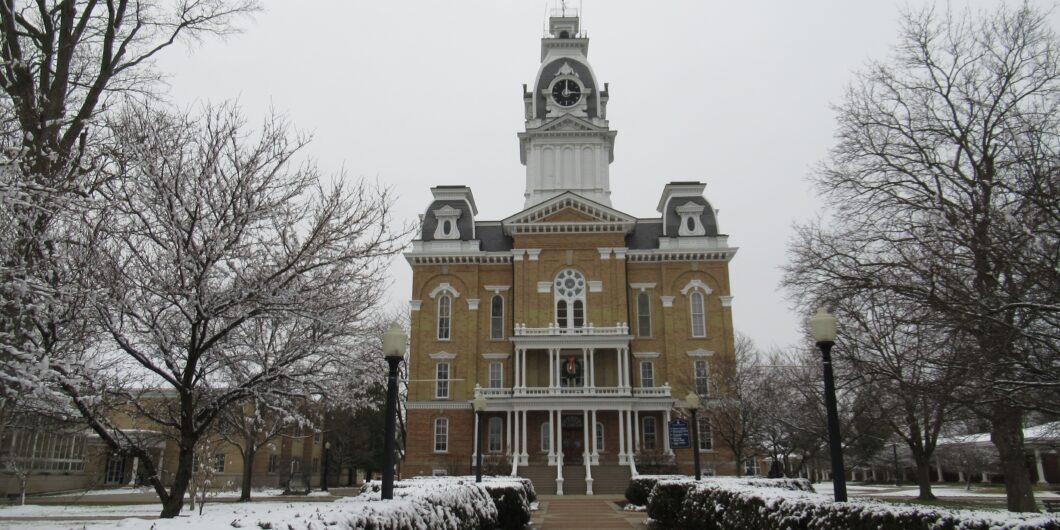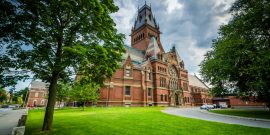Should conservatives recapture American higher education or start anew?
Taking the High Road
The year 2023 was not a good one for the humanities and the liberal arts. A number of public universities, such as West Virginia University, continued the decade-old trend of slashing the humanities disciplines in order to meet budget shortfalls. Something must go, after all, if a university is facing enrollment declines (and obviously it’s not going to be administrators’ salaries). Besides, the number of students majoring in the humanities has not been gently declining—it’s been a merciless freefall for almost two decades now. Factor in curricular overhauls reducing core humanities requirements, and the prophets of doom can fulfill their prophecies quite nicely.
Jeremiads on the above trends abound, and so do recommendations for solutions. It may be more productive, though, to consider an alternate future that is possible, based on two examples of institutions where the humanities have been flourishing in Higher Ed’s apocalyptic age: the conservative Christian colleges Hillsdale and Grove City. Both have a reputation as bastions of conservative politics. A closer look reveals that both share a more interesting commonality, in this age when the humanities in secular institutions are floundering, stripped of all semblance of traditional virtue.
The remarkably high numbers of students majoring in the humanities and the liberal arts at Hillsdale College and Grove City College, by contrast, offer an idea that deserves our attention. The four most popular majors at Hillsdale are: Economics (12%), History (12%), English (9%), and Political Science (7%). And while Grove City College emphasizes its engineering and pre-med programs as well, Literature is still its third most popular major (5% of graduates). Both colleges, furthermore, continue to emphasize the value of the humanities in their general education curriculum, and the size of their tenure-track and tenured humanities faculty body reflects this value.
Let us consider this provocation: what if the future of the humanities lies in Christian colleges—and colleges I would term Christian-adjacent in their mission, like St. John’s College? And what if this means recognizing something distinctly premodern and, most importantly, transcendent about the value of the humanities—their role in shaping human souls and character to produce people and citizens who are not only more ethical and devoted citizens in a democracy, but are also more fulfilled, joyful, and loving? Such valuing of the humanities cannot happen at state universities, divorced as their missions are from matters of the transcendent, the care of souls. But in Christian colleges, this can and should be the mission.
In a blog post in April 2023, I asked: What do we learn if we calculate ratios of faculty per student in various humanities disciplines at different universities? What institution has the highest ratio of Classics faculty per student? When I polled friends anecdotally, they largely assumed that the PhD-granting Ivies would have the highest ratio, but that is not, in fact, the case. Harvard employs one Classicist per 376 students (19 full-time Classics faculty for 7,153 undergraduate students). My PhD alma mater, Princeton, had one Classicist per 280 students (at the time, 19 Classics faculty for 5,321 undergraduates). By contrast, Hillsdale has one Classicist per 216 students (1,515 students and seven Classicists).
Hillsdale’s History Department has a similarly impressive ratio: one historian per 80 students (19 faculty for 1,515 undergraduates). Indeed, the largest Ivy League History Department—Yale, with its 68 faculty for 6,536 students—has a ratio of one historian per 96 students.
Meanwhile at Grove City College, a student body less than half the size of Harvard’s has twice as many English majors. One might counter: this is a comparison of apples and oranges—of institutions like Harvard that simply have many more other degree programs and of those like Hillsdale, which are primarily liberal arts colleges. And yet, I would respond, James Patterson’s concerns in “The Economy of Prestige” show patently the difficulties in which so many Christian institutions find themselves. In this age of enrollment declines, including at small Christian colleges, both Hillsdale and Grove City College are doing quite well overall, unlike their many counterparts, secular or Christian, who have experienced severe enrollment declines and have been slashing the humanities in response.
So, what do these numbers reveal?
The story is two-fold. First, students do vote with their feet, and if offered the chance to partake in a robust general education curriculum that is rooted in the humanities, many rejoice in the opportunity. As Emma Green’s New Yorker profile of Hillsdale College showed last spring, record numbers of students are involved, for instance, in music—even if they are not majoring in it.
Secular state universities, in particular, are increasingly run based on utilitarian principles, focused on getting students into paying jobs but without much attention to job satisfaction. The result is an industrial-treadmill-style approach to the education of persons.
A second contributing factor is the institutional investment in the humanities at some Christian colleges, which have traditionally prioritized character formation in the virtues as an integral part of college education. Because, as the cliché goes, the humanities teach us what makes us human, Christian colleges have found this mission particularly close to their theological hearts. Spiritual formation, after all, is connected to character formation. We are what we read, what we think, what we study. The study of Great Books, history, art, and music forms us to love the good, the true, and the beautiful. The liberals arts have earthly significance and joy, but are also filled with transcendent revelations.
Furthermore, in this age of AI, a robust theology of personhood is essential for understanding the beauty of authentic humanity. AI can do many things more quickly, and seemingly better, than we, feeble creatures of dust that we are. It can learn languages, compose basic essays, play chess at world championship level (or, really, any level ordained), write poetry, create art, and even deliver a sermon.
The appreciation of the humanities requires, in other words, an appreciation for humans and for distinctly human creativity as valuable, significant, and important for a life of flourishing in the here and now. This makes the humanities both practical and transcendent. After all, forming character as a deliberate part of college education will result in graduates who are better people, ones imbued with the virtues that too often are lacking. As philosopher and virtue ethicist Christian Miller has argued, there is a genuine “character gap” among the general population today. People believe that they are better than they really are, which means that they have little interest in growth in the virtues.
And so, it is no coincidence that, in response to the AI revolution, colleges like Grove City have a taskforce considering the incorporation of monastic practices into the curriculum. Historian Molly Worthen outlined this strategy a few months ago in her exhortation that “universities should be more like monasteries.” By banning smartphones, or presenting the opportunity for students to take a vow of silence for a period during the semester, these institutions hope to train minds along with souls, recognizing that human beings are not machines.
To be fair, any college or university—secular just as much as Christian—could, in theory, see the value of the humanities in educating beings who are not just mortal bodies but are also immortal souls. And any university could likewise, in theory, prioritize the formation of character, and therefore emphasize filling students’ minds with things that are good, true, and beautiful as part of the mission. I contend, however, that there is a worldview difference involved that transcends the usual red herring of woke politics. Secular state universities, in particular, are increasingly run based on utilitarian principles, focused on getting students into paying jobs but without much attention to job satisfaction. The result is an industrial-treadmill-style approach to the education of persons. If the worth of a degree or a person is entirely predicated on the money they can earn, the virtues seem irrelevant—and the humanities right along with them. Why bother with monastic practices if one has the narrow goal of preparing the student for a lucrative career in accounting?
Christian colleges could be the best place for the humanities to thrive—but only if these colleges will openly and consciously embrace this mission. If they do, the examples of Hillsdale and Grove City suggest that they may find themselves solving their overall enrollment crisis too, all while serving the American democracy and pointing students to genuine flourishing in an ever-changing and increasingly corrupt world.
In his much grimmer take on the future of Christian colleges, James Patterson divides American higher education institutions into two categories: “struggling mission-driven or formerly mission-driven colleges … and high prestige, secular colleges and universities.” I agree that the vast majority, indeed, fall into these categories, but my suggestions here, based on two mission-driven colleges that are flourishing, is that there is yet a third option. In the case of Grove City, the flourishing of the humanities alongside an engineering program reminds us that a strong humanities focus in the general education curriculum can coexist and flourish alongside the kind of professional training that so many colleges are eager to add.
In this age of AI scandals and plagiarism-prone college presidents, we need colleges that will teach students to be full persons—priceless image-bearers whose souls, just as much as minds and bodies and earning potentials, matter. The humanities are integral to this goal, and Christian colleges and others like them, with a mission dedicated to forming whole persons, are the best poised for the task.



